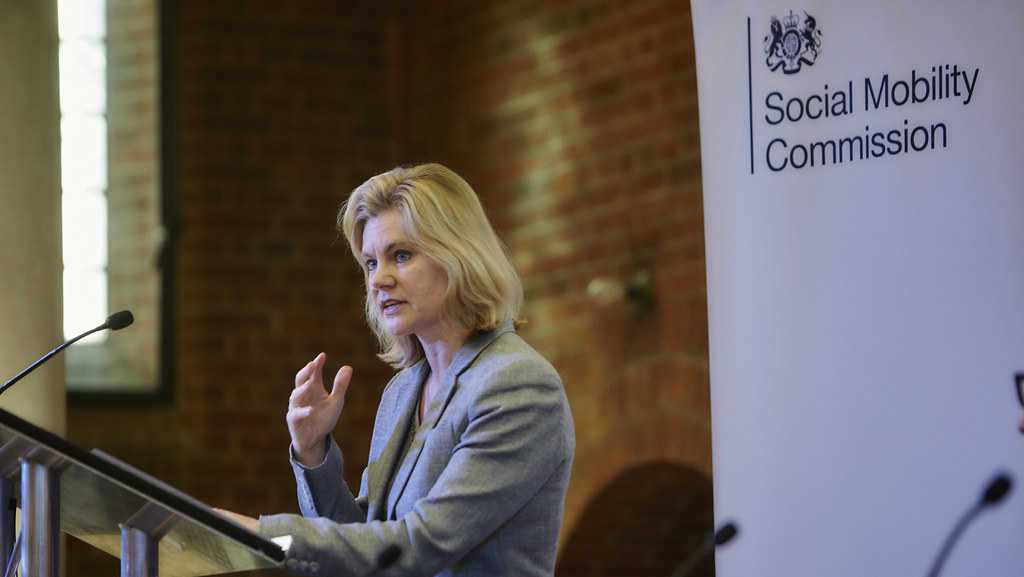Increasing the ability of children from poorer backgrounds to go on to succeed in all walks of life is a ‘cold, hard, economic imperative’ facing Brexit Britain but also a ‘massive generational opportunity’, Education Secretary Justine Greening MP told delegates at a social mobility event last week.
Speaking at the event organised by the Social Mobility Commission with the University’s Centre for the Analysis of Social Policy supported by the Institute for Policy Research, the Education Secretary said that Brexit must mean increasing aspiration and expanding opportunities for young people, in particular for those from the most disadvantaged areas.
Drawing on an increasing geographic divide in social mobility across the UK, she highlighted the stark reality where children from high-income backgrounds who show signs of low-academic ability at aged 5 are still 35 per cent more likely to become higher earners than their poorer peers who, conversely, show early signs of high ability.
With certain areas of the UK up to three times more productive than the least, the Education Secretary suggested that increasing productivity to ensure ‘talent is completely and evenly spread around the country’ must be central to driving greater social mobility in the UK, which remains among the least socially mobile countries in Europe.
Last week's day-long event, 'Left-Behind Britain: Narrowing the Social Mobility Divide', brought together high-profile policy-makers with leading academics, representatives from think-tanks and business to promote a deeper discussion about the causes and consequences of worsening social mobility and child poverty in Britain and possible solutions.
Narrowing the social mobility divide
Delegates at the event also heard from Lord David Willetts (Executive Chair, Resolution Foundation), Professor Brian Nolan (Professor of Social Policy at the University of Oxford’s Institute for New Economic Thinking) for a session on narrowing the social mobility divide. Chaired by Rt Hon Alan Milburn (Social Mobility Commission Chair), this discussed the importance of location in shaping individual’s chances of upward mobility and included strategies to encourage greater job mobility and geographic mobility of labour.
Commenting at the event Alan Milburn said: “Ours is a country where demography still defines destiny. Being born poor all too often condemns a child to a lifetime of poverty. Poor schools ease people into poor jobs. Disadvantage and advantage cascade down the generations. Over decades we have become a wealthier society but we have struggled to become a fairer one.
“Higher social mobility can be a rallying point to prove that modern capitalist economies like our own are capable of creating better, fairer and more inclusive societies. It is the best antidote to the growth of political populism, both of Right and Left, that we are witnessing across the world.
“The point is that it is easy to talk the talk on social mobility. As our lamentable track record as a nation shows it is much harder to walk the walk. Tinkering with change will not turn it around. A new and far bigger national effort will be needed if progress is to be made on reducing poverty and improving mobility. That will mean long-term and fundamental reforms to our country’s education system and local economies, and in the labour and housing markets.”
Driving social mobility at a local level
Afternoon sessions were led by Professor Paul Gregg – who is a member of the Social Mobility Commission - and Dr Susan Harkness of the University’s Department of Social & Policy Sciences and Centre for the Analysis of Social Policy. These considered tackling social mobility from the ground up and highlighted new insights into intergenerational disadvantage on social mobility.
Panellists discussing local level initiatives included Chloe Smith MP (Norwich North), Seema Malhotra MP, (Feltham and Heston), Jackie Powell (Higher Education Progression Partnership Manager, Sheffield Hallam University) and Professor Sue Maguire (Honorary Professor, Institute for Policy Research). Dr Gabriella Conti (Institute for Fiscal Studies and Associate Professor at University College London) and Ana-Llena Nozal (OECD), discussed intergenerational disadvantage on social mobility.
Dr Susan Harkness added: “Tackling the downward spiral of declining social mobility looks set to become increasingly challenging. Yet, failing to do so risks reducing social cohesion. Panelists and attendees at last week’s event recognised that improving social mobility in this country really requires new thinking. There is not only a social imperative to act, but with Brexit, an increasing political one too.”
Read Susan Harkness' article for The Conversation 'Why solving social mobility is a vital political move'.

